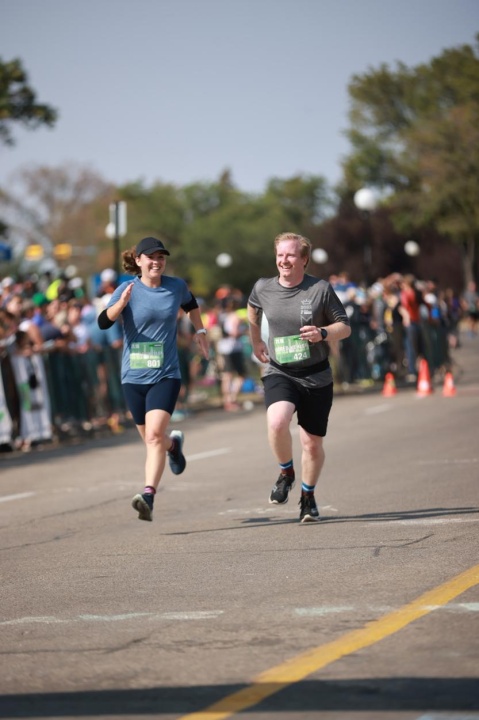My Week-Long Guide to Half Marathon Prep:

You're just one week away from race day!!
Whether it is your first race, or your 10th, everyone can benefit from a curated plan to help support them on race day. I am getting so excited for the race. The atmosphere at the QCM is great. There is something so lovely about 800+ people all coming together towards a common goal.
This year, I will be doing a half marathon. 21.1 Km! However, instead of doing a lot of very specific training, I have been trying to stay active and do some runs, some strength training, and some mobility throughout the summer. This is a for fun race for me. After my triathlon training, I am looking forward to having fun, and enjoying the atmosphere. This year, I have a goal time, but I am not being very strict about it. My husband Jared likes to say I run with my heart, haha! My previous time was 2:48 and we did a walk: run combination. I hope that makes everyone feel a little better and less nervous knowing that if you have a fast or a slow time - everyone is welcome at the race!
Now that the majority of your training is complete: it’s the time to maximize your performance with a carefully planned final week of preparation. This isn't just about logging miles—it's about optimizing your nutrition, refining your mobility, and ensuring your body is primed for your best experience. I've done some research about what we should do a week before the race - and I'll also share what I'm doing, which may be a little different than the recommendations. Here's your guide to making the most of the final seven days before your race.
4-7 Days Before the Race: The Final Long Run
I did what I think will be my final run on Monday, the 26th of August. (Update: I decided to do one today, September 2nd!) I usually like to rest my legs for a full couple of weeks before the race. However, if you would like to add in more at seven days out, and it’s time for your last substantial long effort before race day. An easy-paced long run, around 8-10km would be a reasonable target. Think of this as 50% of your goal. So, if you are running a 5km - I'd aim for no more than 2.5km. Think of this as a confidence builder, not a time to push the pace. The goal is to maintain the endurance you’ve built without overloading your system.
You may also find that some cross training may be nice a few days before the race: whether it’s a swim, a bike ride, or a brisk walk, aim for 30-60 minutes of activity. This will keep your cardio up to snuff before the race.
Nutrition Tip: Focus on complex carbohydrates —whole grains, sweet potatoes, and starchy veggies. These will replenish your glycogen stores, ensuring you’re energized. Hydrate consistently throughout the day. I also like to make sure I am eating enough or more, and enough protein.
Incorporate lean proteins and healthy fats into your meals. Chicken, fish, tofu, avocado, and nuts are perfect choices. These nutrients support muscle recovery and keep you satiated as you taper off of your training.
I always recommend veggies as a part of a balanced diet: vegetables are full of antioxidants, which can be great for muscle repair.
Here is a look at what an athlete's plate should look about a week before race day:

Mobility & Stretching: Start with dynamic stretches like leg swings and high knees to activate your muscles. After your run, take time for static stretches, targeting your hamstrings, calves, and quadriceps. Foam rolling could also be part of your routine, easing out any tightness.
Day 3-4: Easy Does It OR Speed Work to Seal the Deal
Today’s an easy run day—just 3-4 km at a conversational pace. The goal? Keep your legs fresh, your body loose, and your mind focused.
Some people also choose to do a speed run 4 days before the race to help lock in that race pace. you may want to run some intervals: With the race drawing near, a speed workout will help lock in your race pace. Aim for 5 x 800m intervals at your goal pace with 2-3 minutes of rest between each. This session should feel challenging, but not exhausting.
If you are like me, you may skip the run all together and enjoy a nice walk today.
Nutrition Tip: Enjoy more carbs today. Think pasta, rice, or breads. Consider adding an electrolyte drink to your routine, especially if you’re a heavy sweater.
Mobility & Stretching:
I like to continue to do mobility work every night before a race.
2 Days Before the Race: Rest and Recharge
Two days to go, and it’s time to let your body recover. I think a nice walk, and some yoga would be reasonable activities.
I also like to plan out my outfit, do any laundry that I need, and make sure I pack my race bag so there are no day of surprises!
Nutrition Tip: Begin carbohydrate loading in earnest—pasta, bread, rice, and starchy veggies like potatoes and beets should be the stars of your meals. Have a look at my pre-race plate, which ups the carb content of the meals 2 days before the race. I also suggest skipping any processed or takeout foods, as well as minimize any alcohol. Further: don't try any new foods today - keep it consistent with what you already tolerate well. (ie - don't eat a ton of gluten to increase your carbs if you typically eat gluten free)
Meditation: I like to be sure to meditate a few days before the race - I like to visualize myself having fun and doing the run!
Mobility & Stretching: Light stretching or a 20-minute walk will keep your muscles loose. This is about staying relaxed and preparing your body for the big day.

The day before the race: Pre-Race Rituals
Nutrition Tip: High-carb meals throughout the day are your best bet. Enjoy a sweet treat if you like. My favourite pre-race foods include fruit crisps, and sushi for supper! The omega 3's are awesome for your joints, and the rice is a great easily digestible carbohydrate!
Mobility & Stretching: Gentle stretching and relaxation techniques—like deep breathing or meditation—can help calm pre-race nerves and keep your muscles supple.
Sleepy Time: Whenever I am nervous, I tend to not sleep well. Be sure to take your sleep supplements, or try a sleepytime tea 1 hour before bedtime tonight. I also try to repeat to myself that I am so excited, ad your brain doesn't understand the difference between nervousness/ anxiety and excitement.
Race Day: Trust yourself !
The day has arrived! You’re ready, and all that’s left is to do what you set out to do. Your pre-race meal should be more carbohydrate heavy to help replete the liver glycogen that you used up while you slept last night. Try to eat 2-3 hours before the start, should be simple and familiar like a bagel with peanut butter, fruit, and some hard boiled eggs. Hydrate early, but taper off as race time approaches.
Mobility & Stretching: A dynamic warm-up is key to firing up your muscles. Think jogging, leg swings, and maybe some light strides. Post-race, celebrate with some gentle stretching and, of course, proper hydration with electrolytes.
I hope you enjoyed these tips and have a wonderful race. If you see me, let's cheer each other on!
In health,
Dr. Larissa
The Science Behind the Strategy
This week-long plan isn’t just based on experience—it’s grounded in the latest sports science research. Here’s a glimpse into the studies that have shaped this approach:
Carbohydrate Loading: Research on optimal energy metabolism and glycogen replenishment strategies.
Dynamic Stretching: A comprehensive review of dynamic vs. static stretching, emphasizing pre-race benefits.
Hydration: Studies on hydration strategies for endurance athletes, highlighting the importance of balanced fluid intake.
Tapering: Insights into tapering, showing how reduced volume and intensity can peak your performance.
Cross-Training: Research supporting cross-training as a means to enhance recovery and prevent injury while maintaining cardiovascular fitness.





Comentarios